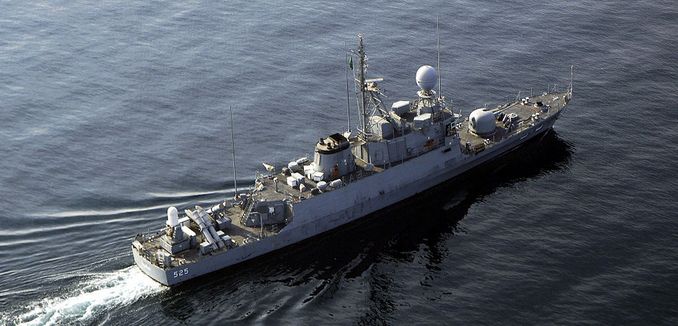Iran’s Islamic Revolutionary Guard Corps warned Saudi Arabia to avoid sailing in international waters next to Iranian territory while the kingdom is conducting ongoing naval exercises, Iranian media reported on Wednesday.
“We declare to all the vessels present in Saudi Arabia’s stated wargames, including the Saudi navy’s vessels and others, that the IRGC Navy believes that principally, these drills are a clear instance of stirring tensions and weakening sustainable security in the Persian Gulf,” the IRGC Navy said in a statement. The force also called on the Saudis to avoid sailing in international waters near Iran’s own, declaring “that any such voyage would not be an instance of harmless passage.”
The Saudi exercises, which began Tuesday and include live-fire drills, are taking place in the Persian Gulf, Strait of Hormuz, and Gulf of Oman, Al Arabiya reported. According to the United States Energy Administration, some 17 million barrels of oil — about 30 percent of all seaborne-traded oil — passed through the Straits of Hormuz daily in 2013.
The commander of the Saudi exercises, Rear Admiral Majed bin Hazza’a al-Qahtani, stated that they were organized “in preparation for the protection of the marine interests of the Kingdom of Saudi Arabia against any possible aggression.” Saudi Arabia has become concerned with the “growing clout in the region of Shiite Iran” in the wake of last year’s nuclear deal, which allowed the Islamic Republic to emerge from its international isolation, Al Arabiya noted.
Iran’s warning to Saudi Arabia comes amid increasing Iranian aggression in the waterways of the Middle East.
On Saturday, Houthi rebels in Yemen, who are reportedly armed by the IRGC, fired at and severely damaged a United Arab Emirates civilian ship sailing in the Bab-el-Mandeb Strait. Millions of barrels of oil pass through the strait daily, raising concerns that Iran could be seeking to control that strategic chokepoint for the world’s oil trade.
In January, IRGC naval forces captured ten American sailors and their two boats in violation of international law. Iran portrayed the seizure as a victory against the U.S., releasing the sailors after claiming that Washington apologized for the incident. Khamenei proclaimed that the naval forces who captured the sailors did “God’s deed” and issued medals to the commanders involved, while the IRGC announced plans to build a statue to commemorate the incident.
In May, the IRGC’s deputy commander threatened to close the Gulf’s strategic Straits of Hormuz to the U.S. and its allies if they “threaten us,” adding: “Americans cannot make safe any part of the world.”
The U.S. Navy reported in July that there were nearly 300 encounters or “interactions” between American and Iranian naval vessels in the Persian Gulf in 2015. While most of the encounters were not considered to be harassment, the behavior of the Iranian navy was found to be less disciplined than that of other navies. Lt. Forrest Griggs, the operations officer of the USS New Orleans, explained that risks arise from the unpredictable behavior and uncertain intent of the Iranian vessels. “It’s very common for them to come up to within 300, 500 yards of us, and then they’ll turn, or parallel us and stop,” he told Fox News.
Vice Adm. Kevin Donegan, the commander of the Navy’s Fifth Fleet, observed in November that Iran’s “malign behavior” at sea had not changed since the announcement of the nuclear deal four months earlier.
[Photo: Mass Communication Specialist 3rd Class Michael Starkey / WikiCommons ]




